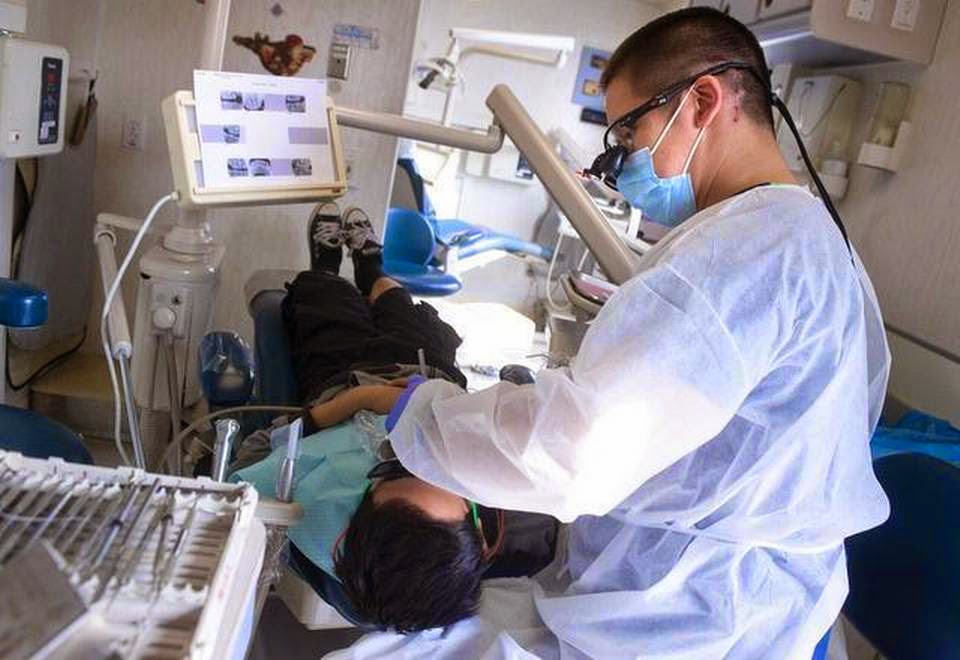 |
| The cost of a dental implant can be prohibitive, ranging from $3,000 to $4,500 per tooth. | Image Source: star-telegram.com |
Dental implants are taking off as an alternative to bridges, dentures and single-tooth partials.
But patients should be cautious before jumping into the expensive procedure: All dentists can do an implant regardless of whether they’ve had specific training. And prices for the three-step process can vary widely.
“It’s a very, very popular procedure,” said Dr. Amerian Sones, executive director of continuing education for the Texas A&M University Baylor College of Dentistry in Dallas. “It’s our most popular course for continuing education.”
About 3 million Americans received 5.5 million implants in 2006, according to the American Academy of Implant Dentistry. The service is growing by 500,000 patients a year, according to the academy.
One reason is the aging population, Sones said. About 25 percent of Americans over 60 have lost all their natural teeth, according to the Centers for Disease Control and Prevention. Almost 70 percent of Americans ages 35 to 44 have at least one tooth missing.
Sones said that implants have become the standard in addressing missing teeth and that the success rate is in the high 90 percentile.
But the cost can be prohibitive, ranging from $3,000 to $4,500 per tooth, according to Angie’s List.
Marianne Marriott, a senior citizen in Fort Worth without dental insurance, said she was surprised by an implant center’s estimate of more than $50,000 for eight implants. Another office gave her a $1,000 estimate for a full set of dentures to address her problems, she said.
Sones said major insurers are starting to cover at least some of the cost for implants. The procedure is lengthy and includes surgery to screw a titanium post into the jaw, place an abutment atop the implant so gum tissue grows over it and then secure a permanent crown over the abutment.
The finished product takes up to six months.
“A lot of insurance companies are seeing the benefits of a long-term solution like implants,” she said.
Some discount dental plans, like DentalPlans.com and Brighter.com, offer price breaks on implants of up to 25 percent, but be sure to check on pricing and coverage before you join.
For those who don’t have the coverage and can’t afford the procedure, consider using a dental school. Baylor offers a full treatment — surgery, abutment and crown — for $1,975 per tooth that is open to new patients, Sones said. A $278 screening fee is also required. To get on the waiting list, call 214-828-8981 or go to http://bcd.tamhsc.edu/patients.
“We’re always looking for new patients,” she said. “But they have to be cases that fit our training criteria,” including having adequate health and quality bone for the procedure, she said.
For those who have been missing adult teeth all their lives, the American Academy of Implant Dentistry is starting a foundation within months to provide free implants for those who can’t afford them, said Max Moses, spokesman for the academy.
Training in implants is imperative for a good outcome, Moses said.
“The bottom line in dentistry is if you’re licensed, you’re licensed to do anything,” Moses said. “There is no implant dentistry recognized by the American Dental Association, like pediatrics or orthodontics.”
Even having a specialty in oral surgery or other advanced dentistry doesn’t mean a dentist is trained in implants, he said.
Besides going through continuing-education programs at dental schools, dentists can become fellows at the academy, Moses said.
Fellowships require having five years of experience and 400 hours of education in implant dentistry; passing a written and oral exam; and presenting 10 personal complex cases before peers.
For a list of area dentists with the certification, sorted by ZIP code, go to the directory at www.aaid-implant.org.
Prospective patients should also ask which type of implant is being used. The original implants, by a Swedish manufacturer, have been found to have a high success rate. But newer generic implants have not been studied.
“There are probably hundreds of different implants and knockoffs,” Sones said. “Companies see a big financial gain for being in this business. You do have to look at good long-term clinical outcomes and research. Find out what their statistics are.”
Bottom line: Do your homework before getting an implant, and make sure your dentist has, too.
Dr. John Pasqual is an experience oral and maxillofacial surgeon. Like this Facebook page for more oral health care tips.
No comments:
Post a Comment